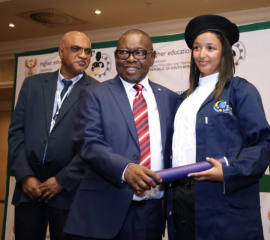
Higher Education and Training Minister, Dr Blade Nzimande, has emphasised the need to drastically increase the number of qualified artisans produced per year in order to realise the country’s National Development Plan (NDP) 2030 target.
Nzimande made the call at the artisan graduation ceremony of over 350 artisans of the Centres of Specialisation (CoS) held at Emperors Palace Hotel, Ekurhuleni, on Tuesday.
In his address, Nzimande noted that South Africa needs at least 60% of school leavers to pursue artisanal type training to meet the country’s demand for scarce skills.
“We honestly need to do more to encourage school leavers to pursue technical trades, as government expands technical and vocational education. This is amongst the reasons why there is a continuous need for suitably qualified artisans to sustain industries and support economic growth in South Africa.”
Nzimande also highlighted that government’s NDP and White Paper for Post-School Education and Training indicates that by 2030 the country should be producing 30 000 qualified artisans per year.
Enrolment
The country is currently producing on average 20 000 qualified artisans per year.
The Minister said the department has noted a decline in the total number of learners who entered artisanal learning programme with 10 302 learners having entered the programme during 2020/21 financial year, reflecting a 36.5% (5 916) decline compared with the 2019/20 financial year.
“I am informed that the reason for the decline is attributed to the introduction of the much-needed Artisan Recognition of Prior Learning (ARPL) model which affected the normal flow of learner registrations as Artisan Development Stakeholders are still getting used to it.
“I am hoping that going forward we will work hard to improve on our enrolments. SETAs (Skills Education Training Authorities) also struggled to register learners, and COVID-19 was sighted as a factor due to limited movements between regions, which affected recruitment,” the Minister said.
Responding to the President’s State of the Nation Address (SONA), Nzimande said he has committed that, through SETAs, the department will increase its targets for Workplace-Based Learning for the financial year, starting on 1 April 2022, to 107 000.
He said the department has also committed to have 15 000 TVET college graduates to be placed for workplace-based learning, which is 5 000 more than the SONA commitments.
“We are also targeting 20 500 opportunities for apprentices, [including] 22 500 for artisanal trades; 31 300 for those completing learnerships and 148 000 for learners entering into various other skills development programmes, such as digital skills, crop production and plant production,” he said.
Decade of the Artisan
The Department of Higher Education and Training declared the year 2014-2024 as the “Decade of the Artisan” to promote artisanship as a career of choice to South Africa’s youth.
The Decade of the Artisan came into existence due to the lack of qualified artisans in the country to sustain industries and support economic growth, which prompted the department to identify artisan training as a priority area for skills development.
The campaign was launched under the theme “It’s cool to be a 21st Century Artisan”.
The artisan campaign was launched in the wake of the demand to successfully implement the country’s Strategic Infrastructure Projects, which included the building of roads, schools, universities, harbours, power stations and other social and economic infrastructure during the fourth administration.
As a result, the department initiated the Centres of Specialisation (CoS) programme and implemented it as a pilot project, with planned intake from the 2019, 2021 and 2022 academic years.
Due to the Centres of Specialisation programme demand, it has been mainstreamed as a model to implement occupational programmes at Technical Vocational Education and Training (TVET) colleges. – SAnews.gov.za


